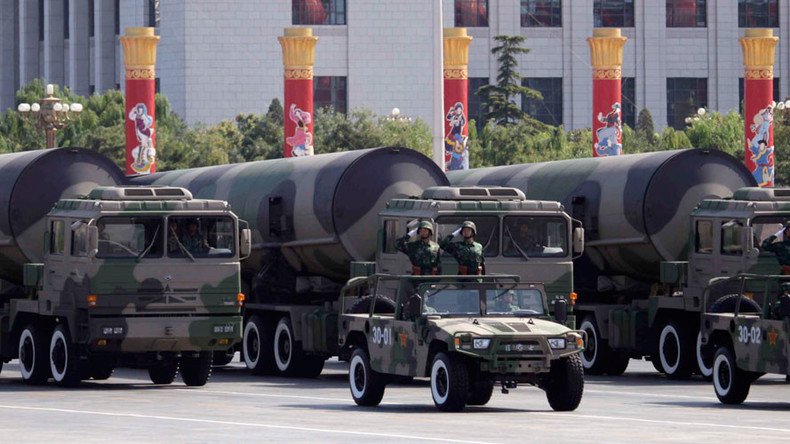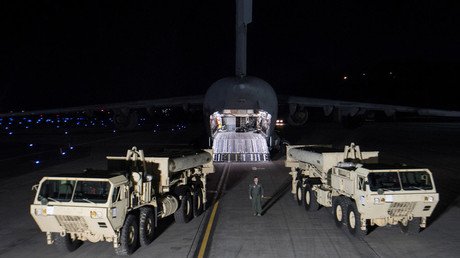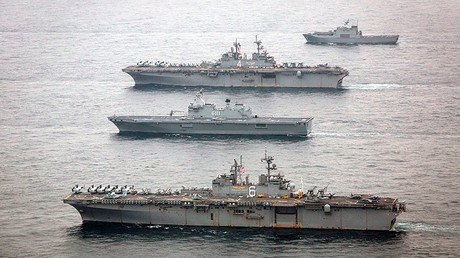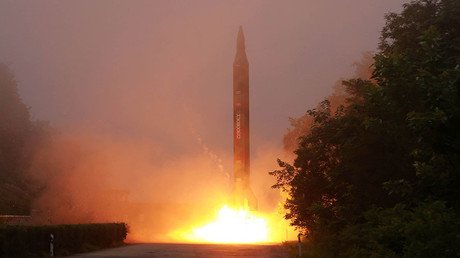China must strengthen nuclear arsenal in response to THAAD deployment – state media

An editorial in China’s state-run Global Times newspaper says Washington should "pay the price" for the deployment of missile defense system THAAD to South Korea. China should build up its nuclear arsenal and closer ally with Russia in response, it says.
READ MORE: US deploys missile defense in S. Korea despite Russia, China opposition
The article in the paper, often viewed as Beijing’s mouthpiece, refers to the Terminal High Altitude Area Defense system (THAAD) battery that began to arrive to Osan Air Base in South Korea this week.
It says that China has "maintained a low profile" when it comes to nuclear armaments, and that its number of nuclear warheads is small – but that could now change.
"The United States has deployed a missile defense system right in front of China's door, and they must pay for that decision," the editorial says. "China must make sure THAAD deployment is being made in vain, by strengthening its own nuclear deterrent."
The author says that "China has ample financial resources to expand its nuclear arsenal."
"In the game between China and the United States, there is not just the hand of the Washington side," the article continues.
It notes that sanctions are not the way forward when it comes to the US, given the size of its economy. It also points out that Lockheed Martin, the US maker of THAAD, does not have any business dealings in China, thus making it impossible to introduce sanctions on the company.
The article also called on China to form an alliance with Russia – a fellow critic of THAAD's deployment –to form a "solid partnership against the missile defense system."
Such an alliance would "give a new blow to the United States," the editorial states.
THAAD is an advanced system designed to intercept short, medium and intermediate-range ballistic missiles during their terminal flight phase. Equipped with long-range radar, it is believed to be capable of intercepting North Korea’s intermediate-range ballistic missiles.
China has long spoken out against the system, which will be based at a former golf course near Seoul, over fears that it will undermine Beijing's own ballistic missile capabilities.
Beijing previously urged the US and South Korea not to go ahead with the deal, with Chinese Foreign Ministry spokesman Geng Shuang warning last month of "consequences" should the agreement go ahead.
China says that THAAD will not help peace and stability in the Korean Peninsula – a sentiment shared by Moscow, which previously urged Seoul and Washington to consider escalated tensions which will inevitably be caused over the deployment.
Although the editorial has stated that sanctions against the US would be a poor move, Seoul says that Beijing has implemented unofficial sanctions on South Korea, claiming it believes authorities have told travel agencies to stop selling trips to the country.
Just weeks ago, Chinese authorities also stopped construction at a multibillion-dollar real estate project being commissioned by South Korean retail giant Lotte. The company struck a land swap deal with Seoul in February, trading the golf course which will be used to host THAAD for a parcel of military-owned land.
In December, China made the decision to deny applications to South Korean airlines to expand charter flights, in a move which Seoul says was “indirect” retaliation for the deployment of the missile system. South Korean Minister of Strategy and Finance Yoo Il-ho later said Beijing had not taken any retaliatory measures that merited an official response.
China also canceled visits from South Korean celebrities in China in response to the deal, with several newspapers calling for boycotts of all such entertainers in China.
Meanwhile, the US and South Korea have consistently maintained that THAAD is a defensive measure against Pyongyang, as it is believed to be capable of intercepting North Korea's intermediate-range ballistic missiles.
South Korean officials have said they expect the THAAD missile system to be deployed and operational this year, with one official saying last month that deployment could be completed by August.















